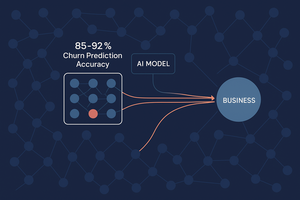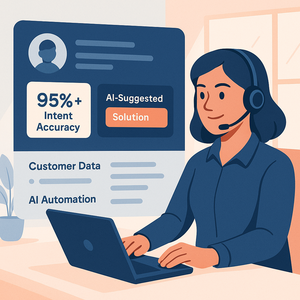Navigating the AI Transformation Tightrope: Balancing Innovation, Regulation, and Human Capital
The artificial intelligence landscape in late 2025 presents a complex picture of immense opportunity tempered by significant operational challenges....
5 min read
 Peter Vogel
:
September 22, 2025
Peter Vogel
:
September 22, 2025

The artificial intelligence (AI) landscape is evolving at an unprecedented pace, presenting both immense opportunities and significant challenges for UK businesses. From addressing concerns about model degradation and establishing robust AI governance, to harnessing agentic AI and scaling developer productivity, staying informed is crucial for sustained competitive advantage.
Emerging patterns reveal a shift in the AI implementation space, demanding a strategic approach that balances innovation with responsibility. The increasing prevalence of AI-generated content also presents new quality control challenges, requiring businesses to focus on authenticity and brand values. These developments collectively underscore the need for a practical guide to navigate this complex landscape.
This week, we distil key AI news into actionable insights, providing a practical guide for navigating this complex landscape. We cut through the hype and focus on what truly matters: strategic implementation, demonstrable business impact, and ethical considerations. This article is specifically designed for Operations/Technology Executives, Marketing Leaders, Growth-Focused CEOs, Sales Directors, and Customer Service Leaders in UK mid-market companies, offering tailored guidance for their specific roles and organisational needs.

The increasing concern around AI model providers potentially downgrading model quality post-launch to reduce costs poses a significant threat to the reliability of AI-driven processes. The root of the problem isn't necessarily that the models are flawed, but that the infrastructure and environment around them causes inconsistencies. This is highlighted by Anthropic's post-mortem admission that routing bugs affected up to 30% of requests (Anthropic, 2025), demonstrating that model performance can vary unexpectedly.
For organisations, inconsistent model output can compromise the reliability of AI-driven processes and decision-making. Detecting subtle performance degradation and ensuring fairness in AI-driven systems presents a significant implementation challenge. Businesses must therefore implement robust monitoring systems and establish clear quality assurance protocols to mitigate these risks.

Growing pressure on AI companies to demonstrate responsible AI practices, driven by regulatory scrutiny and societal concerns, highlights the critical need for robust AI governance frameworks. Regulatory bodies are increasingly scrutinising AI development, as evidenced by the US government's requirement for OpenAI and Anthropic to submit new models for safety testing before release (US Government, 2025). Furthermore, increasing regulatory frameworks around AI governance create additional implementation layers, particularly in highly regulated industries like financial services and healthcare (AI Ethical Considerations Report, 2025).
Organisations must therefore prioritise data privacy and security in AI system design, implement robust audit trails and explainability mechanisms, and ensure transparency and fairness in AI systems. A key implementation challenge lies in balancing innovation with compliance, requiring businesses to develop a comprehensive and ethical approach to AI adoption.

The growing potential of AI agents to automate complex tasks and workflows presents significant opportunities for improving efficiency and productivity. For instance, Replit's Agent 3 demonstrates the capability of AI agents to perform complex coding tasks autonomously for up to 200 minutes (Replit, 2025), a 10x increase in autonomy over its predecessor. However, organisations must avoid the '80/20 AI trap,' where impressive demos fail to translate into tangible business outcomes due to challenges in the final 20% of implementation (Helium42 Analysis, 2025).
Integrating AI agents with existing systems, ensuring data security and compliance, and managing human-agent collaboration remain potential implementation challenges. Businesses must therefore carefully identify suitable use cases for AI agents and develop clear implementation strategies that prioritise strategic alignment and measurable business outcomes.

The potential of AI to significantly amplify the capabilities of software engineers, reducing development time and costs, presents a compelling opportunity for organisations to enhance operational efficiency. The launch of coding agents within Warp (Warp, 2025), for example, enables fluid, agentic workflows directly from the command line, enhancing developer output. Furthermore, the increasing demand for AI skills across industries highlights that AI literacy is becoming as fundamental as digital literacy (AI Skills Landscape Report, 2025).
Integration with existing development workflows, ensuring team adoption, and the need for robust change management represent potential implementation challenges. Organisations must therefore invest in comprehensive AI training for software engineers and adopt AI-powered development tools to fully leverage this opportunity, fostering a culture of continuous learning and adaptation.

The increasing prevalence of AI-generated content and the potential for a flood of low-quality material to drown out meaningful content presents a significant challenge for businesses. The mass production of AI-generated episodes by Inception Point AI's Quiet Please podcast network (Inception Point AI, 2025) exemplifies this trend, producing over 3,000 episodes weekly across 5,000 shows at a cost of under $1 per episode. This highlights the urgent need to focus on quality over quantity in content creation and develop strategies to maintain brand authenticity.
Maintaining consistent quality, ensuring ethical content creation, and managing increasing content demands represent potential implementation challenges. Organisations must therefore prioritise brand values and human creativity to mitigate the risks of relying solely on AI for content creation, ensuring content genuinely resonates with their audience.

The artificial intelligence landscape in late 2025 presents a complex picture of immense opportunity tempered by significant operational challenges....

The discourse surrounding artificial intelligence is maturing. Across boardrooms and operational teams, the conversation has decisively shifted from...

The artificial intelligence landscape is no longer a distant frontier; it's rapidly reshaping the present, demanding a strategic response from...